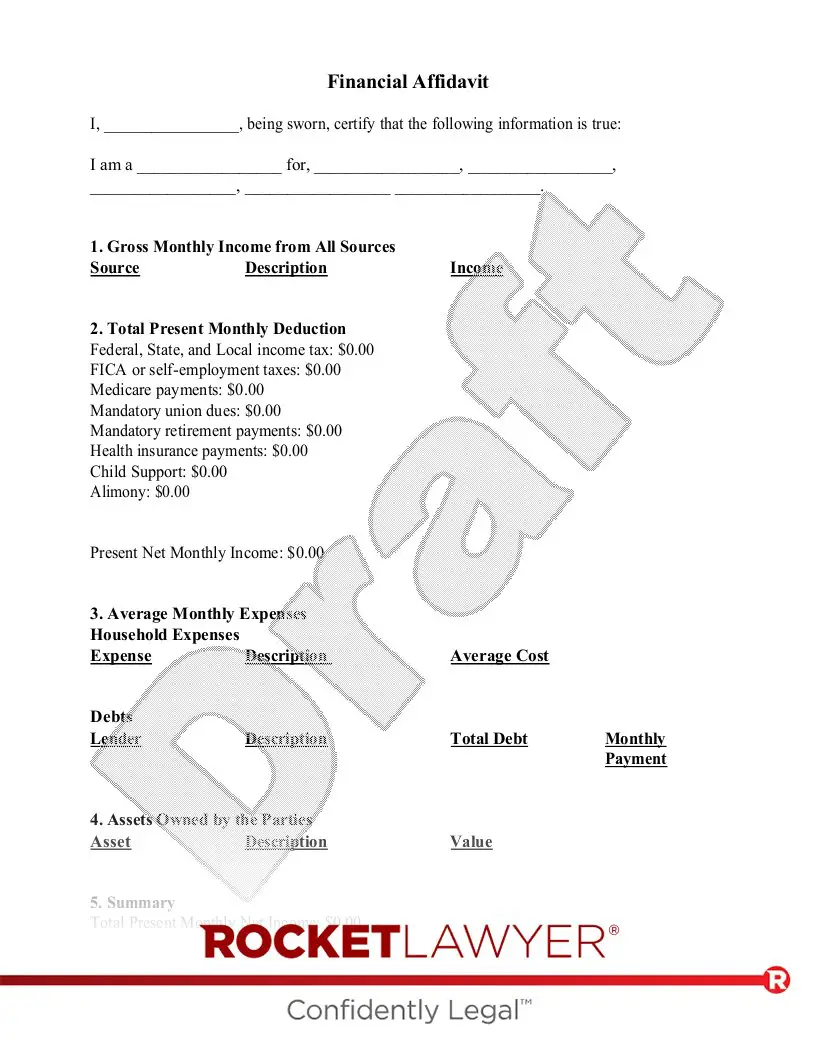A financial affidavit in legal cases is a crucial document that provides a detailed overview of a person’s financial resources, assets, debts, and expenses. It serves as a tool to assess an individual’s financial standing, particularly in matters such as divorce, child support, or spousal maintenance. By presenting a comprehensive snapshot of one’s financial situation, a financial affidavit helps the court make informed decisions regarding financial matters. In this article, we will explore the significance of financial affidavits, their components, and how they play a vital role in legal proceedings. Let’s delve into the intricacies of what is a financial affidavit in legal cases.
What is a Financial Affidavit in Legal Cases?
A financial affidavit is a key document used in legal cases, particularly in family law disputes and civil litigation. It is a sworn statement that provides detailed information about an individual’s financial situation, including their income, assets, debts, and expenses. The purpose of a financial affidavit is to ensure transparency and fairness in legal proceedings by enabling all parties involved to have a clear understanding of each party’s financial circumstances.
The Importance of a Financial Affidavit
In legal cases, where financial matters play a significant role, a financial affidavit serves a crucial purpose. It helps the court in making informed decisions regarding various aspects, such as child support, alimony, division of assets, or determination of financial responsibility. Here are some reasons why a financial affidavit is essential:
1. Full Financial Disclosure: A financial affidavit requires individuals to disclose all relevant financial information, ensuring transparency and reducing the potential for hidden assets or income.
2. Evidence of Financial Standing: The affidavit provides evidence of an individual’s financial standing, allowing the court to assess their ability to meet financial obligations or claims.
3. Determining Support: In cases involving child support or alimony, a financial affidavit helps determine the appropriate amount based on each party’s financial situation.
4. Equitable Distribution of Assets: When dividing marital assets during divorce proceedings, a financial affidavit aids in ensuring a fair distribution by considering each party’s financial position.
5. Protection Against Fraud: By requiring individuals to provide accurate and complete financial information under oath, a financial affidavit helps prevent fraudulent claims or hiding of assets.
Components of a Financial Affidavit
A typical financial affidavit includes several sections that cover different aspects of an individual’s financial circumstances. While the specific requirements may vary depending on the jurisdiction or type of case, here are the common components found in a financial affidavit:
1. Personal Information: This section includes details such as the individual’s name, address, contact information, and social security number.
2. Income: Here, the individual lists their sources of income, including salaries, wages, self-employment earnings, rental income, pension or retirement benefits, and any other money received regularly. Supporting documents such as pay stubs, tax returns, or bank statements may be required for verification.
3. Assets: This section requires individuals to disclose their assets, such as real estate properties, personal property, bank accounts, investments, vehicles, valuable items, and any other significant assets they own. Supporting documents like property deeds, bank statements, or appraisals may be needed.
4. Debts and Liabilities: Individuals must provide information about their outstanding debts, including mortgages, loans, credit card balances, medical expenses, or any other financial obligations they have. Relevant documentation like loan agreements or credit card statements may be necessary.
5. Expenses: This section captures the individual’s monthly expenses, such as housing costs, utilities, transportation, groceries, childcare, healthcare, education, and other necessary expenses. Supporting documents like bills, receipts, or invoices may be required.
6. Additional Information: Some financial affidavits include sections for additional information, where individuals can provide details about extraordinary expenses, anticipated changes in income, or any other relevant financial details specific to their case.
Preparing a Financial Affidavit
Creating a comprehensive and accurate financial affidavit requires careful attention to detail and adherence to specific guidelines. Here are some steps to follow when preparing a financial affidavit:
1. Gather Financial Documents: Begin by collecting all relevant financial documents, including bank statements, tax returns, pay stubs, loan agreements, investment statements, and any other records that verify your financial information.
2. Organize Information: Review the financial documents and organize the information in a systematic manner, ensuring that it aligns with the sections outlined in the financial affidavit. Ensure accuracy and completeness to maintain credibility.
3. Fill Out the Affidavit: Using the provided template or format, fill out the financial affidavit, entering the required information under each relevant section. Be thorough and provide accurate details to present a clear picture of your financial situation.
4. Swear or Affirm the Affidavit: Once completed, the financial affidavit needs to be signed and notarized. This step certifies that the information provided is true and accurate, under the penalty of perjury.
5. Attach Supporting Documents: Compile and attach all necessary supporting documents to substantiate the information provided in the financial affidavit. These documents help verify the accuracy of the information provided.
6. Review and Update: Regularly review and update the financial affidavit as circumstances change, ensuring that it remains current and reflects the most accurate financial information.
In legal cases involving financial matters, a financial affidavit plays a crucial role in providing a comprehensive overview of an individual’s financial situation. It ensures transparency, facilitates fair decision-making, and helps establish financial responsibilities. By accurately disclosing income, assets, debts, and expenses, individuals can contribute to a more equitable resolution of legal disputes. It is important to consult with legal professionals for guidance on specific requirements and to ensure the financial affidavit fulfills its intended purpose.
Divorce Financial Affidavits in Child Support & Family Law Cases
Frequently Asked Questions
Frequently Asked Questions (FAQs)
What is a financial affidavit in legal cases?
A financial affidavit is a document that provides a detailed overview of an individual’s financial situation. It is commonly used in legal cases, such as divorce proceedings or child custody battles, to assess the financial capabilities and obligations of the parties involved.
Why is a financial affidavit important in legal cases?
A financial affidavit is important in legal cases as it helps the court make informed decisions regarding matters such as alimony, child support, or dividing marital assets. It provides a comprehensive view of an individual’s income, expenses, debts, and assets, ensuring fairness and transparency in legal proceedings.
Who is required to submit a financial affidavit?
In legal cases that involve financial matters, such as divorce or child support, both parties are typically required to submit a financial affidavit. This allows the court to assess each party’s financial situation and make appropriate decisions regarding financial obligations and division of assets.
What information is included in a financial affidavit?
A financial affidavit generally includes information about an individual’s income, expenses, assets, and liabilities. It may require details such as employment history, salary, bank accounts, investments, real estate holdings, outstanding debts, and monthly expenses to provide a comprehensive overview of their financial circumstances.
How should I fill out a financial affidavit?
When filling out a financial affidavit, it is important to provide accurate and detailed information. Ensure that you include all relevant financial data, such as sources of income, monthly expenses, and any debts or assets you possess. Double-check the information before submitting to avoid any errors or omissions.
Are financial affidavits confidential?
Typically, financial affidavits are not considered confidential documents. They are filed as part of legal proceedings and may become accessible to the opposing party and the court. However, the specific rules regarding confidentiality can vary based on jurisdiction, so it is advisable to consult an attorney for guidance.
Can I be penalized for providing false information in a financial affidavit?
Yes, providing false information in a financial affidavit can have serious consequences. Courts treat such actions as perjury or contempt of court, which can lead to fines, sanctions, or even imprisonment. It is crucial to provide honest and accurate information to maintain the integrity of the legal process.
What if I am unable to complete a financial affidavit accurately?
If you are facing challenges in completing a financial affidavit accurately, it is advisable to seek professional help. Consulting with an attorney or a financial expert can provide guidance and ensure that you provide the necessary information correctly. They can also help you understand the legal implications and consequences of providing inaccurate information.
Final Thoughts
A financial affidavit is an essential document in legal cases that provides a detailed overview of an individual’s financial situation. It encompasses information about income, assets, liabilities, and expenses, acting as a tool to assess a person’s financial standing. This affidavit plays a crucial role in divorce proceedings, child support determinations, and other family law matters. It serves as evidence to support or challenge claims related to financial support, property division, and custody arrangements. By requiring individuals to disclose their financial information, a financial affidavit helps ensure fairness and transparency in legal proceedings.



